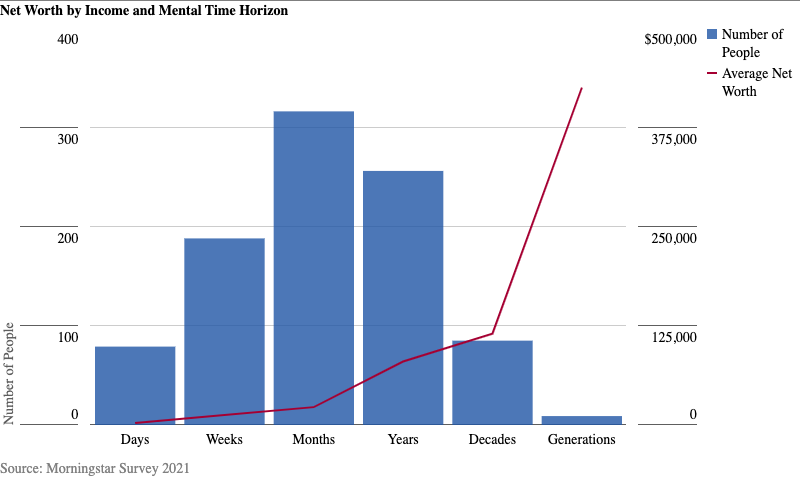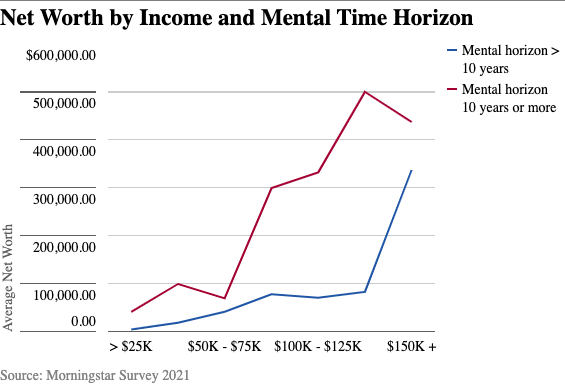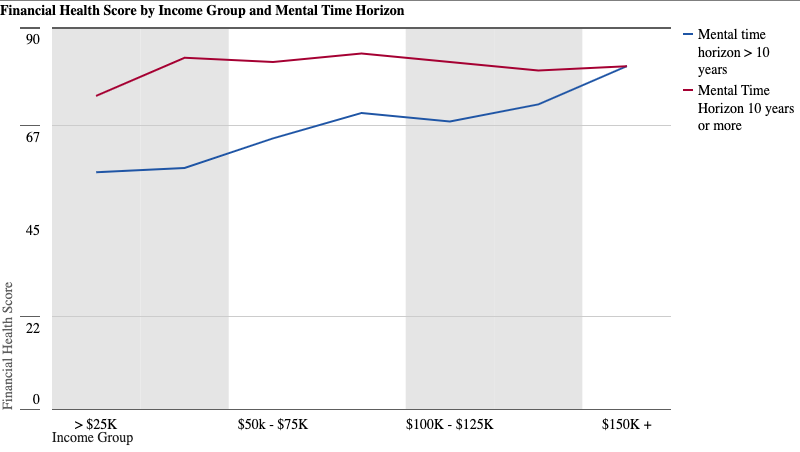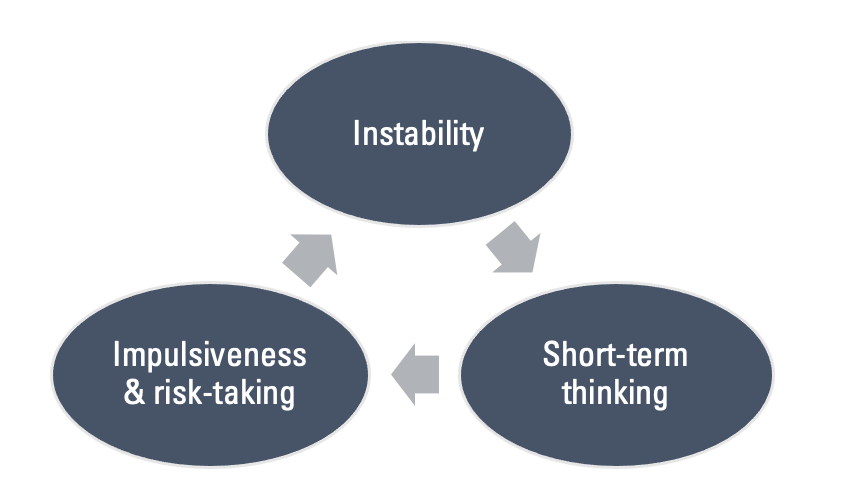Sarah Newcomb believes the point at which your view of future certainty starts to blur is the point at which you probably don’t have a financial plan of any kind.
In the world of finance, we often think about decades-long investment time horizons.
In doing so, many of us have unconsciously trained ourselves to think long-term because that’s the nature of the job. This long-term planning mindset is something we can take for granted, but most people don’t think this way. That matters. A lot.
What is Mental Time Horizon?
In a recent study for Morningstar, I asked a nationally representative sample of more than 900 US households the following question: “when you think about your finances, how far into the future do you tend to think and plan?”
I call this a person’s mental time horizon. It’s the point at which your mental picture of the future becomes fuzzy or unformed. Some can see only a few days ahead. Others look to the next generation. Innovators and entrepreneurs often think in generations or even millennia. The typical man on the street tends to think in the short term, however, as the results of our survey show.

In our sample most people, regardless of age, income, or education reported thinking several years ahead at most. This may explain why so many people struggle to save, invest, and adequately plan for the future. If you’re not even thinking about it, what motivation do you have to prepare?
Why Does It Matter?
In our study we found that, in every income group, people who think at least 10 years ahead had saved significantly more than peers who had a shorter mental time horizon.
We saw a generally positive relationship between income and net worth, but in every income group, the average reported net worth was significantly higher among those with longer mental time horizons than those who reported thinking less than 10 years ahead.

The study also asked participants to complete a financial health survey created and validated by the Financial Health Network. (See the full FHN survey and methodology here.)
In every income group, people who said they think at least 10 years ahead had significantly higher financial health scores than their peers with shorter mental time horizons.
Linear regression showed that answers to this one question explained 27% of the variation in financial health scores (for comparison, income accounted for only 8% of the variance in financial health scores).

The Relationship is Likely Bidirectional
Which comes first: a high net worth or thinking about the future? It could be either one. For example, someone with more debt than assets may also have a high degree of instability in their life, financial or otherwise.
Instability makes it hard to look into the future because there is so much uncertainty. It’s very difficult to plan for 10 years out when you don’t know what will happen next week.
Unfortunately, short-term thinking can set us up for a poverty trap. Psychologists have found that short-term thinking is generally associated with more-impulsive, risk-taking behavior, and so those with a limited mental time horizon may make choices that exacerbate their financial insecurity, creating a negative feedback loop.

Morningstar Disclaimers:
The opinions, information, data, and analyses presented herein do not constitute investment advice; are provided as of the date written; and are subject to change without notice. Every effort has been made to ensure the accuracy of the information provided, but Morningstar makes no warranty, express or implied regarding such information. The information presented herein will be deemed to be superseded by any subsequent versions of this document. Except as otherwise required by law, Morningstar, Inc or its subsidiaries shall not be responsible for any trading decisions, damages or losses resulting from, or related to, the information, data, analyses or opinions or their use. Past performance is not a guide to future returns. The value of investments may go down as well as up and an investor may not get back the amount invested. Reference to any specific security is not a recommendation to buy or sell that security. It is important to note that investments in securities involve risk, including as a result of market and general economic conditions, and will not always be profitable. Indexes are unmanaged and not available for direct investment.
This commentary may contain certain forward-looking statements. We use words such as “expects”, “anticipates”, “believes”, “estimates”, “forecasts”, and similar expressions to identify forward-looking statements. Such forward-looking statements involve known and unknown risks, uncertainties and other factors which may cause the actual results to differ materially and/or substantially from any future results, performance or achievements expressed or implied by those projected in the forward-looking statements for any reason.
The Report and its contents are not directed to, or intended for distribution to or use by, any person or entity who is a citizen or resident of or located in any locality, state, country or other jurisdiction where such distribution, publication, availability or use would be contrary to law or regulation or which would subject Morningstar or its subsidiaries or affiliates to any registration or licensing requirements in such jurisdiction.
MeDirect Disclaimers:
This information has been accurately reproduced, as received from Morningstar, Inc. No information has been omitted which would render the reproduced information inaccurate or misleading. This information is being distributed by MeDirect Bank (Malta) plc to its customers. The information contained in this document is for general information purposes only and is not intended to provide legal or other professional advice nor does it commit MeDirect Bank (Malta) plc to any obligation whatsoever. The information available in this document is not intended to be a suggestion, recommendation or solicitation to buy, hold or sell, any securities and is not guaranteed as to accuracy or completeness.
The financial instruments discussed in the document may not be suitable for all investors and investors must make their own informed decisions and seek their own advice regarding the appropriateness of investing in financial instruments or implementing strategies discussed herein.
If you invest in this product you may lose some or all of the money you invest. The value of your investment may go down as well as up. A commission or sales fee may be charged at the time of the initial purchase for an investment. Any income you get from this investment may go down as well as up. This product may be affected by changes in currency exchange rate movements thereby affecting your investment return therefrom. Any decision to invest should always be based upon the details contained in the Prospectus and Key Investor Information Document (KIID), which may be obtained from MeDirect Bank (Malta) plc.





